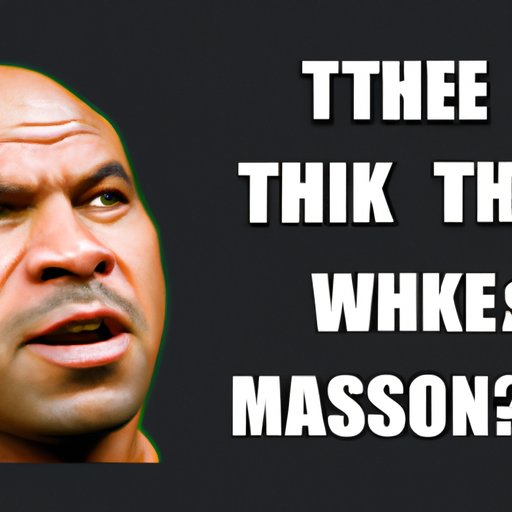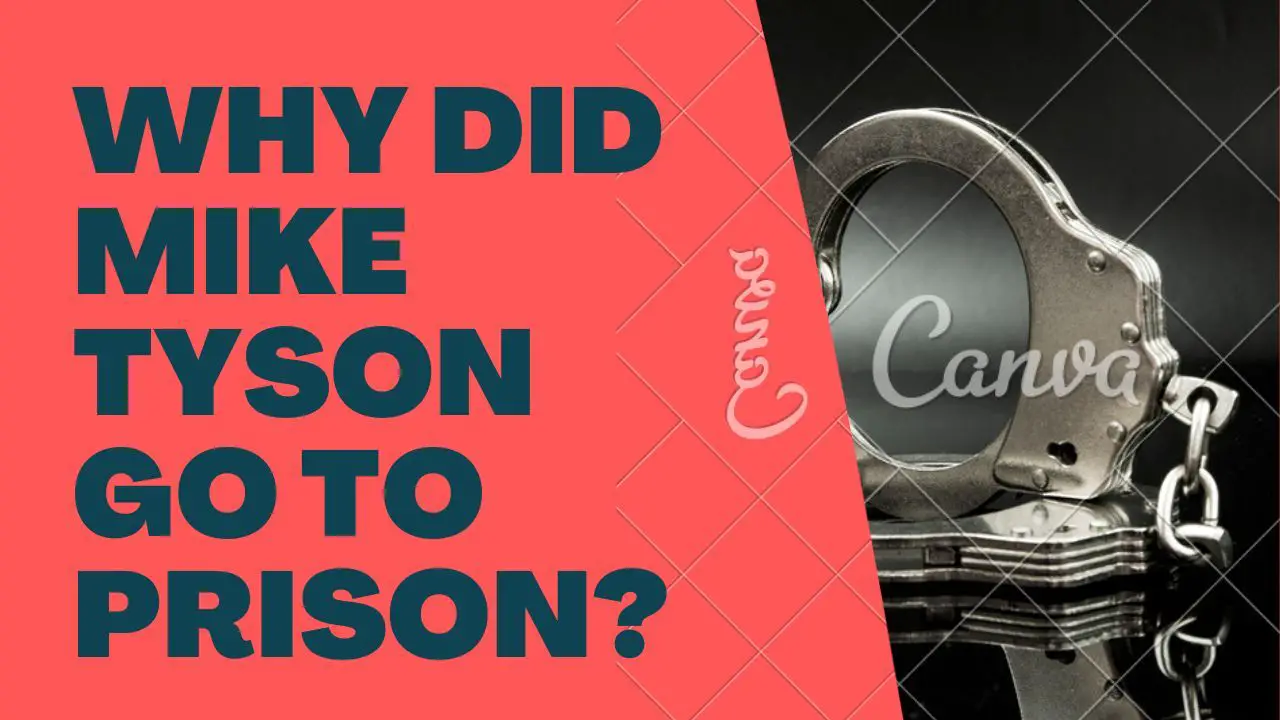Mike Tyson, the former heavyweight boxing champion, has had a life filled with both triumphs and controversies. His journey to becoming one of the most iconic fighters in history is well-documented, but the question that often comes up is why did Mike Tyson go to prison? In this article, we'll dive deep into the events that led to his incarceration, the impact it had on his career, and how he managed to rebuild his life afterward. So, buckle up and let's get into it!
Tyson's story is not just about boxing; it’s also about resilience, redemption, and the challenges of fame. While his boxing career was meteoric, his personal life was fraught with drama. Understanding why Mike Tyson ended up in prison is crucial to understanding the man behind the legend. This article will explore the legal issues, the aftermath, and the lessons learned from his experience.
As we delve into the details, we’ll uncover the events that shaped his life during and after his time in prison. Whether you're a fan of boxing or just curious about the man himself, this article will give you insights into one of the most talked-about periods in Tyson’s life. Let’s get started!
Read also:Subscription Models The Ultimate Guide To Unlocking Value And Growth
Biography of Mike Tyson
Before we dive into why Mike Tyson went to prison, let’s take a moment to understand who he is. Born on June 30, 1966, in Brooklyn, New York, Tyson grew up in a tough neighborhood. His early life was marked by poverty and struggles, but his passion for boxing changed everything.
Here’s a quick overview of his life:
Data and Facts About Mike Tyson
| Full Name | Michael Gerard Tyson |
|---|---|
| Date of Birth | June 30, 1966 |
| Place of Birth | Brooklyn, New York, USA |
| Profession | Professional Boxer |
| Weight Class | Heavyweight |
| Claim to Fame | Youngest heavyweight champion in history |
Tyson’s rise to fame was nothing short of spectacular. At the age of 20, he became the youngest heavyweight champion in history, defeating Trevor Berbick in 1986. His aggressive fighting style and knockout power made him a household name, but his personal life often overshadowed his achievements.
Why Did Mike Tyson Go to Prison?
Now, let’s address the elephant in the room: why did Mike Tyson go to prison? It all started during the 1992 Miss Black America pageant in Indianapolis. Tyson attended the event, and things quickly took a turn for the worse. According to reports, he was accused of raping a contestant named Desiree Washington. The incident led to a highly publicized trial.
The Events Leading to His Incarceration
Here’s a breakdown of what happened:
- Tyson met Desiree Washington at the pageant and invited her to his hotel room.
- Washington claimed that Tyson sexually assaulted her, while Tyson maintained that the encounter was consensual.
- A jury found Tyson guilty of rape in 1992, and he was sentenced to six years in prison.
- He served three years before being released on parole in 1995.
The trial was a media circus, with reporters from all over the world covering the story. Tyson’s reputation took a massive hit, and his boxing career was put on hold. Many fans were shocked by the allegations, while others stood by him, believing he was innocent.
Read also:Building Strong Friendships A Guide To Lasting Connections
The Impact on Tyson's Career
Tyson’s time in prison had a profound impact on his boxing career. When he was released, the boxing world had moved on without him. New champions had emerged, and the public’s perception of him had changed. However, Tyson was determined to make a comeback.
Here are some key points about how prison affected his career:
- He lost his heavyweight title while in prison.
- His return to the ring was met with mixed reactions from fans and critics.
- Tyson’s first fight after prison was against Bruce Seldon in 1995, which he won by knockout.
Despite the challenges, Tyson managed to regain some of his former glory. He even reclaimed the WBC heavyweight title in 1996 by defeating Frank Bruno. However, his second bout with Evander Holyfield ended in controversy when Tyson bit Holyfield’s ear, leading to another suspension and fine.
Lessons Learned from Tyson’s Incarceration
Tyson’s experience in prison taught him valuable lessons about life, responsibility, and the importance of making better choices. While he was behind bars, he spent time reflecting on his actions and working on his personal growth.
Here are some key takeaways:
- Tyson realized the importance of staying grounded despite fame and fortune.
- He began to focus on self-improvement and mental health, which became a significant part of his post-prison life.
- Tyson’s time in prison also highlighted the need for accountability and the consequences of one’s actions.
After his release, Tyson became more open about his struggles with addiction and mental health. He even sought therapy and became an advocate for others dealing with similar issues.
Public Reaction and Media Coverage
The media played a significant role in shaping public opinion about Tyson’s case. The trial was covered extensively, with journalists dissecting every detail of the incident. Some outlets portrayed Tyson as a victim of circumstances, while others painted him as a predator.
Here’s how the public reacted:
- Fans were divided, with some believing Tyson was innocent and others convinced of his guilt.
- The media’s portrayal of the case influenced public perception, often swaying opinions one way or another.
- Tyson’s image suffered greatly, and it took years for him to rebuild his reputation.
Despite the negative press, Tyson remained a polarizing figure. His comeback in the ring generated a lot of buzz, and his fights continued to draw large audiences.
Rebuilding His Life After Prison
After serving his sentence, Tyson focused on rebuilding his life. He returned to boxing, but he also explored other avenues, such as acting and public speaking. His post-prison career was marked by both successes and setbacks, but he never lost his determination to make a difference.
Here’s how Tyson rebuilt his life:
- He became a motivational speaker, sharing his story with audiences around the world.
- Tyson appeared in several movies and TV shows, including "The Hangover" and "Boardwalk Empire."
- He started a podcast, "Hotboxin' with Mike Tyson," where he discusses various topics, including his life experiences.
Tyson’s journey from prison to redemption is a testament to his resilience and ability to adapt. He continues to inspire others with his story of overcoming adversity.
Legal and Ethical Implications
Tyson’s case raises important questions about the legal system and the treatment of high-profile individuals. The trial brought attention to issues such as consent, accountability, and the role of the media in shaping public opinion.
Here are some ethical considerations:
- The legal system must ensure fair treatment for all, regardless of fame or status.
- Consent is a critical issue that needs to be addressed in all aspects of society.
- Media outlets have a responsibility to report accurately and fairly, without sensationalizing stories.
Tyson’s case remains a topic of discussion, with many people still debating the merits of the verdict. Regardless of one’s opinion, it’s clear that the case had a lasting impact on both Tyson and the legal landscape.
Mike Tyson's Legacy
Despite the controversies, Mike Tyson remains one of the most influential figures in boxing history. His legacy extends beyond the ring, as he continues to inspire others through his story of redemption and resilience.
Here’s how Tyson’s legacy is remembered:
- He is celebrated for his incredible boxing skills and achievements.
- Tyson’s journey from prison to success serves as a powerful reminder of the possibility of redemption.
- He remains a cultural icon, with a larger-than-life personality that captivates audiences worldwide.
As Tyson himself once said, "Everyone has a plan until they get punched in the mouth." His life is a testament to the importance of perseverance and the ability to rise above adversity.
Conclusion
In conclusion, the question of why Mike Tyson went to prison is a complex one that involves legal, ethical, and personal factors. While the incident tarnished his reputation, it also provided an opportunity for growth and reflection. Tyson’s story is a powerful reminder of the importance of accountability, resilience, and redemption.
We encourage you to leave your thoughts in the comments below. What are your views on Tyson’s case? How do you think it impacted his career and legacy? Share this article with your friends and let’s continue the conversation!
Table of Contents
- Biography of Mike Tyson
- Why Did Mike Tyson Go to Prison?
- The Impact on Tyson's Career
- Lessons Learned from Tyson’s Incarceration
- Public Reaction and Media Coverage
- Rebuilding His Life After Prison
- Legal and Ethical Implications
- Mike Tyson's Legacy
- Conclusion
Remember, life is full of ups and downs, but it’s how we respond to challenges that defines us. Mike Tyson’s story is a testament to the power of resilience and the possibility of redemption. Keep fighting, keep pushing, and never give up!


